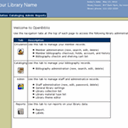Uncovering the Best Aleph Alternative for Your Library
Aleph, the integrated library system, has long been a go-to solution for libraries seeking comprehensive tools and workflow support. However, as technology evolves and library needs diversify, many institutions are now exploring an Aleph alternative that might better align with their specific requirements, budget, or operational philosophy. This article delves into some of the top contenders that offer robust features, flexibility, and a modern approach to library management.
Top Aleph Alternatives
Whether you're looking for open-source flexibility, a user-friendly interface, or a community-driven development model, these alternatives provide compelling reasons to consider a switch from Aleph.

Koha
Koha stands out as the first free and open-source software library automation package. It's a highly regarded Aleph alternative, offering a continuously evolving feature set driven by its large user community. Being open-source and available for Linux and self-hosted deployments, it provides immense flexibility and control over your library's data and operations, including comprehensive library and web-based management features.

Evergreen ILS
Evergreen ILS is a highly scalable, free, and open-source software solution for libraries, making it an excellent Aleph alternative, especially for larger institutions or consortia. Available for Linux and self-hosted environments, Evergreen helps patrons efficiently find materials while providing libraries with robust tools for managing, cataloging, and circulating resources.

OpenBiblio
OpenBiblio offers an easy-to-use, automated library system written in PHP, making it a viable Aleph alternative for libraries seeking a straightforward and accessible solution. It is free and open-source, supporting Mac, Windows, and Linux platforms. Its features include OPAC, circulation, cataloging, and staff administration functionality, providing a complete suite for small to medium-sized libraries.
Choosing the right Aleph alternative ultimately depends on your library's specific needs, technical capabilities, and community support preferences. We encourage you to explore each option further to find the best fit that will empower your library for years to come.